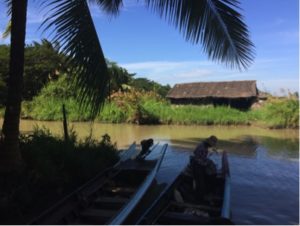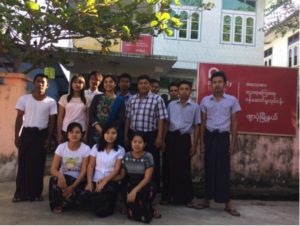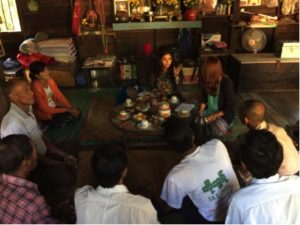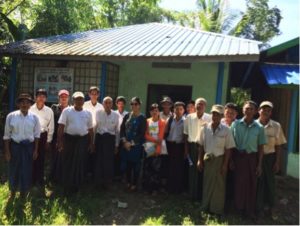Thanks to the generosity of the Weidenfeld-Hoffmann Trust and the Max Weidenfeld Travel Grant, I had the unique opportunity to visit Myanmar for a week, where I led a team of undergraduate and graduate students from Oxford as part of the Oxford Microfinance Initiative (OMI).
The OMI works with various micro-credit organisations across the world, providing voluntary consultancy services. Our client, Proximity Finance, is based in Myanmar and provides various microfinance products to its rural beneficiaries. Most of their target consumers are engaged in agriculture, an increasingly volatile and insecure occupation, thus making financial sustainability essential. The industry policy of treating micro-credit as a service and not a charity not only provides dignity to the beneficiaries but also strikes a balance between the social and financial goals of the organisation. To further improve this balance, Proximity Finance wanted assistance in formulating a Social Performance Management (SPM) framework, a recognised tool to improve organisational and management practices for enhanced client protection. The purpose of my visit was to collect some qualitative research material to be able to design a framework that is not only faithful to established standards but also relevant to the needs of Proximity Finance.
I arrived in Yangon on the 4th of January after two most amusing hours at the immigration counter. I spent the day visiting the city’s numerous pagodas and savouring some local food. The similarities with India were striking and yet there were many new cultural idioms that I observed over the next couple of days.
The Shwedagon Pagoda
The following day was spent at Proximity Finance’s headquarters in Yangon where I conducted interviews with the Product Design, Operations, HR and Training, Data Analysis, and Research teams. The aim of this was to understand first-hand how the organisation works across and between these various levels. This information also helped me analyse the gaps between the head office and the deep field.
My ride for the day
I spent the next four days visiting several villages in Pyapon and Kungyangon Townships. My first round of interviews was with the Branch Officers and Loan Officers, the personnel who interact directly with the beneficiaries. These interviews revealed issues about staffing, lack of training and levels of client satisfaction. I then met the Small Lending Groups (SLGs) who borrow from Proximity Finance and other micro-credit organisations to be able to buy agricultural implements and livestock. Discussions with these groups brought to light some of the positive features of the Proximity Finance loan product: it had a better interest repayment pattern, friendly loan officers and an easy application process. We also discussed some deeper structural issues behind rural poverty, including unfair pricing mechanisms for their agricultural produce and a lack of proper education. There was a general feeling that no one wanted their children to continue being farmers. It was interesting to observe some convergences and divergences in narratives across various levels of the organisations. Being in the deep field with the beneficiaries was a deeply humbling experience. Not only did I gather a lot of relevant information, I also left with the conviction that this was the kind of work I wanted to be involved in after I graduate.
Meeting Branch Officials at Pyapon Township
Meeting the lending group at Thae Eain Kyaung Su village
Meeting the lending group at Kyaungsu- East village
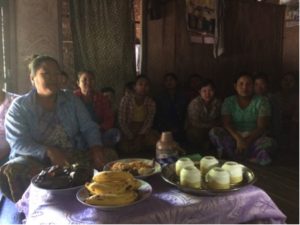
The lending group at Kyon Thut Tany village
I went back to the headquarters, armed with all my research. An informal round-table was organised for me to present my findings to the various teams and discuss the way forward. As a result of the language gap, there were often certain things that got lost in translation. This final follow-up meeting helped plug in those discrepancies. My concerns about over-staffing, training, and creating an organisational culture of social performance were well received by the CEO, the Programme Manager, and the various teams.
Despite the language barrier, discussions were always candid and animated, especially among this group of women
Now that I’m back in Oxford, I am sharing my experience and findings with the rest of my team so that we can all collaborate to produce the final report. This document will do a landscape assessment of best practices in Social Performance Management, followed by specific recommendations for Proximity Finance. We will also examine some case studies from other micro-credit organisations with a similar focus on rural agro-based beneficiaries, preferably in South East Asia. This will enable us to make a comparative assessment about feasibility and effectiveness.
This trip to Myanmar would not have been possible without the Proximity Finance team in Yangon, who gave me unhindered access to their information and human resources. From the headquarters to the branch office to the homes of the clients, everyone made sure I was made to feel welcome and comfortable at all times. I hope that as a team, we are able to put together a report that is valuable to the organisation and its mission.
Payaswini Tailor (India, MPhil Political Theory, 2015-17) is an Oxford-Weidenfeld and Hoffmann Scholar





